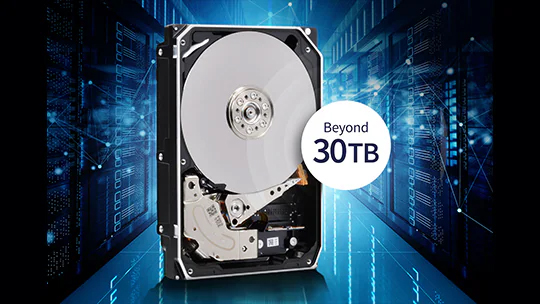Toshiba demonstrates 30TB+ HDDs using HAMR and MAMR technologies — customer sampling scheduled for 2025
31TB and 32TB hard disk drives were demonstrated.

Toshiba just demonstrated its first drives that can store more than 30TB using HAMR (Heat Assisted Magnetic Recording) and MAMR (Microwave Assisted Magnetic Recording) technologies — proof that there are still ways hard disk technology can compete against more modern solid-state drives.
The company achieved 32TB on a drive that used the former, while it managed to get 31TB with the latter. Toshiba issued a press release detailing this achievement and mentioned a planned test deployment of the drive next year.
Although most commercial and end-users would prefer the faster speeds of SSDs they are often far more expensive than HDDs, especially for larger capacities. That means individuals, entities, and corporations that store a lot of data will find mechanical technology far more economical than solid state drives. So, you’ll usually find these types of drives in advanced data centers or on large NAS systems.
For example, a 22TB Western Digital Gold hard drive will set you back $600, while an 8TB 2.5-inch Samsung SATA SSD costs more with its regular price of $849.99. Even when on sale, the 22TB HDD costs $459.99, while the latter costs $563. This means that the HDD costs around $27 per terabyte, while the SSD costs almost triple at a little over $70. You may say that the almost $50 price difference means nothing to big companies. But when you multiply this amount by the hundreds or thousands of drives a server uses, you’ll soon be saving real money.
The two technologies Toshiba used for its 30+TB drive, HAMR and MAMR, aren’t new developments. In fact, other companies have also launched drives using these technologies. Seagate, one of Toshiba’s biggest competitors, has already shipped samples of its 30TB+ HAMR HDDs to its server clients for testing in 2023, while Western Digital has reportedly been experimenting with MAMR tech in its 18 to 20TB HDDs since 2019.
With more and more services moving to the cloud each year, many data centers need to expand their storage capacities. 4K and 8K video is also likely playing a part in the growth of the demand for these massive hard drives, especially as more and more movies and videos are produced in such quality. That’s because a one-hour movie shot in full HD video only needs 1.4GB of storage while a one-hour 4K or 8K blockbuster averages 22 to 38GB.
Achieving 30TBs in a single hard drive will then be a massive space saver, especially as the next step down in the capacity ladder is just 24TB. Going up to 30TB from 24 means you get 25% more storage in the same size and, presumably, the same or almost similar power draw.
Get Tom's Hardware's best news and in-depth reviews, straight to your inbox.
High capacity HDD competition
These developments will hopefully make data storage more affordable, keeping cloud services at a reasonable price. Here are some of the future HDD capacities we expect in the near future: Seagate said in 2023 that it has targeted 32TB and 40TB HDDs, while Western Digital announced in 2022 that it plans to hit 50TB in the coming years. Toshiba also expects to release a 40+TB hard drive by 2027. So, even though HDDs are getting rarer and rarer in the laptop and desktop PC spaces, HDD manufacturers are still going full steam ahead with their developments for servers and data centers.

Jowi Morales is a tech enthusiast with years of experience working in the industry. He’s been writing with several tech publications since 2021, where he’s been interested in tech hardware and consumer electronics.
-
vijosef ReplyFor example, a 22TB Western Digital Gold hard drive will set you back $600, while an 8TB 2.5-inch Samsung SATA SSD costs more with its regular price of $849.99.
Actually, the SAMSUNG 870 QVO SATA III SSD 8TB costs 563$ in Amazon today. -
USAFRet Reply
"List price" of $849.99, as the article states.vijosef said:Actually, the SAMSUNG 870 QVO SATA III SSD 8TB costs 563$ in Amazon today. -
gg83 Asianometry on YouTube has a great video about the hdd market. Do we think 30tb is basically the peak? After that cost won't be justified?Reply -
USAFRet Reply
Some years ago, 1TB was thought to be the peak.gg83 said:Asianometry on YouTube has a great video about the hdd market. Do we think 30tb is basically the peak? After that cost won't be justified? -
gg83 Reply
Valid point for sure. The exponential growth has flattened quite a bit though.USAFRet said:Some years ago, 1TB was thought to be the peak. -
Notton It's a limitation of physics. The magnetic grain can only get so small before it becomes noise to the head and requires new technology.Reply
The first? breakthrough was the much hated SMR, then Helium, and now HAMR/MAMR.
I think the next one is Laser and should bring about 50TB sizes.
DRAM has a similar problem with capacitor size limitations. When it is too small it can no longer retain a charge, and requires a new and ever more exotic high-K dielectric material.